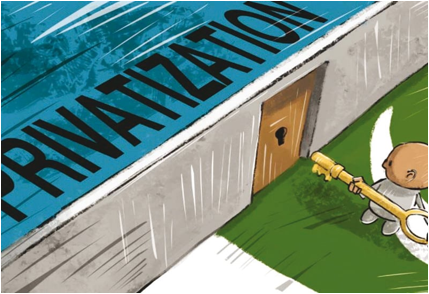INP-WealthPk
Moaaz Manzoor
The IMF’s recent staff-level report, published on its website, projected zero privatization revenues from FY2019-20 to FY2030, despite repeated commitments by the government to expedite the sale of commercially viable state-owned enterprises (SOEs), reports WealthPK.

A major hurdle remains incomplete classification of state-owned entities into strategic and non-strategic categories. Last year, the Cabinet Committee on Privatization (CCoP) categorized 40 state-owned enterprises (SOEs) as strategic, while identifying 84 for potential privatization.
Speaking with WealthPK, Dr. Nasir Iqbal, Associate Professor and Registrar at the Pakistan Institute of Development Economics (PIDE), acknowledged the government's repeated pledges but noted that structural inefficiencies and overemployment in public institutions remain a “very deep-rooted issue” that is “very difficult to solve shortly.”
He argued that in the short term, the government should shift its focus toward curbing avoidable financial losses rather than waiting for large-scale reforms to materialize.
“What the government can do now is to eliminate new employment and redirect the existing staff to ease the burden on key ministries,” he said, adding that while privatization is the ultimate fix, it’s not a viable prospect in the near term. Make a win-win situation. But that doesn’t seem to be in the near future,” he observed.
Echoing similar concerns, economist Shahid Mehmood highlighted the pressing need for pension reforms, which have been delayed for over a decade. Pension reforms have been much needed for at least a decade, but successive governments kept delaying them for one reason or another, he said.
According to Shahid, the growing fiscal burden has now made these reforms unavoidable, even though they are likely to impact only recent entrants and will not deliver instant fiscal relief. He warned that absence of a protective framework for employees amid these changes could aggravate social and institutional discontent.
“It will also be imperative to safeguard employees' interests through prudent investments. For that, the government does not seem to have any plan,” he added.
The recent push for privatization, including advisory agreements and policy meetings, shows a reactive approach rather than a well-devised strategy. Bureaucratic inertia, overlapping ministerial responsibilities, and weak institutional capacity continue to hinder momentum. Compounding this is Pakistan’s low investment grade rating, which makes its privatization drive far less attractive to foreign investors, even when political will appears to exist.
The government's restructuring efforts reflect an urgent need to address fiscal imbalances, but their success hinges on effective execution and safeguarding employees’ interests. While immediate adjustments may offer short-term relief, sustainable solutions such as privatization and strategic investments are essential for achieving long-term fiscal stability.
Credit: INP-WealthPk













